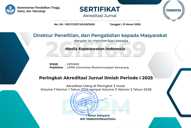Qur’anic Therapy (Islamic Bibliotherapy) To Improve Religious Coping In Hemodialysis Patient
(1) Sekolah Tinggi Ilmu Kesehatan Aisyiyah Bandung
(2) Sekolah Tinggi Ilmu Kesehatan Aisyiyah Bandung
(*) Corresponding Author
Abstract
Patients with chronic kidney disease and receiving hemodialysis, they will deal with chronic stress related to time restriction, financial and functional limitations, dietary restrictions, and drug side effects. The purpose of the present study was to determine the effect of psychoreligius therapy: Qur'anic therapy (Islamic bibliotherapy) on the religious coping of hemodialysis patients. The study was conducted at Al-Islam Bandung Hospital used pre-experimental with pre and post-test design. We used purposive sampling, 22 sample, they were 5 years undergoing hemodialysis, able to read and Muslim. Psychological Measure of Islamic Religiousness (PMIR) to measure religious coping with a correlation coefficient of 0.88. ). The sample was given reading with sincere themes, patience, gratitude according to al-Qur' values for 1 month (8 reading themes), about 30 minutes, religious coping measured before and after the intervention. There was a significant effect of the intervention of Quranic therapy on religious coping (p = 0.048 , the analysis used Paired T-test. Islamic psychoreligius Therapy: Qur'anic Therapy promoted to improve religious and coping skills in hemodialysis patients through Quranic Therapy. Therefore, in cases of chronic diseases such as chronic renal failure, nurses should apply a holistic care approach with emphasis on spirituality-based intervention.
Keywords
Full Text:
PDFReferences
Chen, Tsai, Hsu, Wu, Sun, Chou, … Wang. (2010). Depression and suicide risk in hemodialysis patients with chronic renal failure. Psychosomatics, 51(6), 528–528.
Frih, B., Kacher, W., Bouzguenda, A., Jaafar, H., Alkandari, S. A., Ben Salah, Z., … Frih, A. (2017). Effects of listening to Holy Qur’an recitation and physical training on dialysis efficacy, functional capacity, and psychosocial outcomes in elderly patients undergoing haemodialysis. Libyan Journal of Medicine, 12(1). https://doi.org/10.1080/19932820.2017.1372032
Gaston-Johansson, F., Haisfield-Wolfe, M. E., Reddick, B., Goldstein, N., & Lawal, T. A. (2013). The relationships among coping strategies, religious coping, and spirituality in African American women with breast cancer receiving chemotherapy. Oncology Nursing Forum, 40(2), 120–131. https://doi.org/10.1188/13.ONF.120-131
Gonçalves, J. P. D. B., Lucchetti, G., Menezes, P. R., & Vallada, H. (2017). Complementary religious and spiritual interventions in physical health and quality of life: A systematic review of randomized controlled clinical trials. PLoS ONE, 12(10), 1–22. https://doi.org/10.1371/journal.pone.0186539
Hmwe, N. T. T., Subramanian, P., Tan, L. P., & Chong, W. K. (2015). The effects of acupressure on depression, anxiety and stress in patients with hemodialysis: A randomized controlled trial. International Journal of Nursing Studies. https://doi.org/10.1016/j.ijnurstu.2014.11.002
Hofmann, S. G., Asnaani, A., Vonk, I. J. J., Sawyer, A. T., & Fang, A. (2012). The efficacy of cognitive behavioral therapy: a review of meta-analyses. Cognitive Therapy Research. https://doi.org/10.1007/s10608-012-9476-1.The
James O. Burton, Jefferies, H. J., Selby, N. M., & McIntyre, C. W. (2009). Hemodialysis-induced repetitive myocardial injury results in global and segmental reduction in systolic cardiac function. Clinical Journal of the American Society of Nephrology, 4(12), 1925–1931.
Musarezaie, A., Ghasemi, M., Momeni-Ghaleghasemi, T., Khodaee, M., & Taleghani, F. (2015). A study on the efficacy of spirituality-based intervention on spiritual well being of patients with leukemia: A randomized clinical trial. Middle East Journal of Cancer, 6(April), 97–105.
Raiya, A. (2008). A Psychological measure of Islamic religiousness: Evidence for relevance, reliability and validity. Bowling Green State University.
Reza, I. F. (2016). Implementasi koping religius dalam mengatasi gangguan fisik-psikis-sosial spiritual pada pasien gagal ginjal kronik. Jurnal Keislaman Dan Kemayarakatan, 22(2), 243–280. https://doi.org/10.19109/intizar.v22i2.940
Stecz, P., & Kocur, J. (2014). Religiousness, religious coping with illness, and psychological function among polish elderly patients with osteoarthritis undergoing Arthroplasty. Journal of Religion and Health, 54(2), 554–570. https://doi.org/10.1007/s10943-014-9842-2
Tandi, M., Mongan, A., & Manoppo, F. (2014). Hubungan antara derajat penyakit ginjal kronik dengan nilai agregasi trombosit. Jurnal E-Biomedik (EBM).
Valcanti, C. C., Chaves, E. D. C. L., Mesquita, A. C., & et al. (2012). Religious/spiritual coping in people with chronic kidney disease undergoing hemodialysis. Revista Da Escola de Enfermagem Da USP. https://doi.org/http://dx.doi.org/10.1590/S0080-62342012000400008
Article Metrics
Abstract view : 1926 timesPDF - 139 times
DOI: https://doi.org/10.26714/mki.1.3.2018.12-17
Refbacks
- There are currently no refbacks.
Copyright (c) 2018 Inggriane Puspita Dewi, Anggriyana Tri Widiyanti

This work is licensed under a Creative Commons Attribution 4.0 International License.
This journal is indexed by:
Kedungmundu Raya No. 18 Semarang NRC Building Universitas Muhammadiyah Semarang
Phone: 02476740287
Fax: 02476740287
Email: mki@unimus.ac.id





















